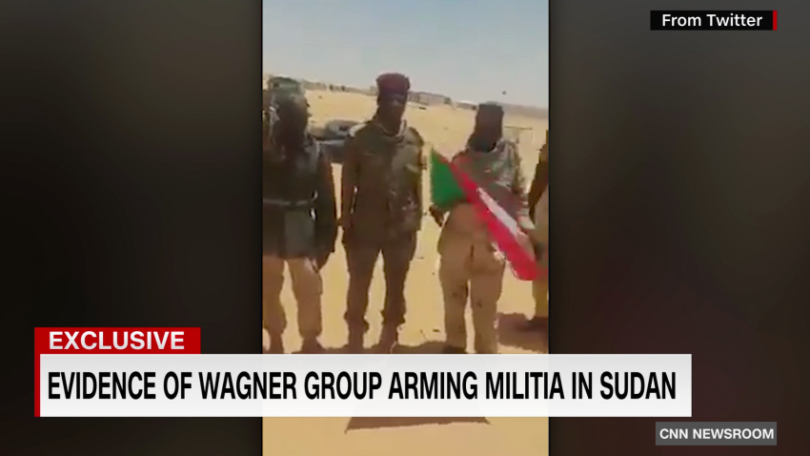Frida Ghitis
On the day before Russia launched its full-scale invasion of Ukraine last year, a top general from Sudan was visiting Moscow. Gen. Mohammed Hamdan Dagalo – known as Hemedti – had already made a name for himself leading one of the so-called Janjaweed militias that helped carry out a genocide in Sudan’s Darfur region decades earlier.
Until last week, Dagalo was also one of the two military men leading a Sudanese government that was meant to be working its way to a democratic transition. By the time he went to Russia last year, Dagalo and his militia, Sudan’s Rapid Support Forces (RSF), were already the primary beneficiaries of involvement in Sudan by the Wagner Group, the Kremlin-linked mercenary army that has been fighting in Ukraine recently, but also has a wide footprint in Africa and other parts of the world. Wagner, under the leadership of oligarch and ex-convict Yevgeny Prigozhin, has been helping Russian President Vladimir Putin achieve his goals outside Russia’s borders, while providing a thin veneer of deniability. Now, according to CNN’s investigation, the Wagner Group is helping arm Dagalo’s RSF with surface-to-air missiles as they battle the Sudanese National Army, led by Dagalo’s former ally, Gen. Abdel Fattal al-Burhan.
The RSF denies receiving help from Russia. And Wagner similarly denied being involved in the conflict. The two generals have been linked to brutal human rights abuses and have a history of launching coups together. Vying for power and for wealth, they have now thrown the lives of millions of Sudanese civilians into fresh chaos, and threaten to bring havoc to a key region even beyond Sudan’s territory.
Many countries have played a role in the catastrophe that is unfolding in Sudan. But Russia’s – and the Wagner Group’s – role is particularly egregious. It helps to highlight just how destabilizing Russia has become across the globe. Using Wagner, Putin’s intervention is not only worsening the conflict, it is helping to crush what was left of the Sudanese people’s dreams of democracy. In 2019, an almost unbelievable revolution led mainly by Sudan’s women of extraordinary courage helped topple the dictator Omar al-Bashir, who had ruled the country for more than three decades.
Bashir has been charged with genocide by the International Criminal Court for his conduct of a war where massacres and worse were almost routine, in which Dagalo led a brutal militia and Burham led the army. To protect himself from the army’s power, Bashir formalized Dagalo’s Janjaweed militia as the RSF. But when the pressure from pro-democracy protesters became unstoppable, the two generals joined forces to push Bashir out. They agreed to a democratic transition. Instead, some four years later, the country is in the grip of some of the worst violence seen in decades, the prospects for democracy looking remote, at best. But Russia’s Wagner was already in Sudan even before the pro-democracy uprising. A CNN investigation last year revealed the growing ties between Moscow and Khartoum’s generals. According to US officials, the military was pretending to be helping usher the country to democracy, but military leaders were growing stronger by making deals that traded the wealth of impoverished Sudan for weapons.
The deals, CNN discovered, had started in 2015, just after Russia captured and annexed Ukraine’s Crimean peninsula. International sanctions complicated Russia’s finances, so the Kremlin used the Wagner Group to get its hands on Sudan’s gold mines. In exchange for the gold, which a company owned by Wagner’s leader helped extract, the generals would get Russian arms and political support. It wasn’t the first time Wagner, Putin’s cat’s paw, had moved deep into mineral-rich Africa. CNN and others have documented Wagner’s often brutal and enormously profitable tactics across the continent.
Wagner is helping Putin achieve three objectives in Sudan. In addition to the gold, Putin wants to expand his sway as he – and his Chinese allies – seek to replace the US and the West’s influence. Just as importantly, Putin wants to secure a military base on the strategically vital Red Sea, a route to the Suez Canal navigated by much of the world’s commerce, including oil tankers from the Persian Gulf. Two months ago, Russian Foreign Minister Sergei Lavrov traveled to Khartoum. At the time, Reuters reported that Lavrov said an agreement had been reached on a naval base at Port Sudan on the Red Sea, but Sudanese legislation was needed to seal the deal. The recent document leak by a National Guard member included a document, reviewed by the Washington Post, that reports Lavrov and the Sudanese military leaders discussed completing that Russian base by the end of this year. Russia has always aspired to expanding its naval bases. It wanted one on the Mediterranean, which was one of the reasons it intervened – with a strong Wagner Group presence – in the Syrian civil war. Now Russia’s base in Syria’s Latakia port has apparently become a transshipment port for Russian weapons for Sudan’s RSF, coordinated by the Wagner Group and its allies.
A couple of days before the fighting exploded in crowded Khartoum, a Russian Ilyushin-76 transport plane flew from a military base in Libya to Latakia, and then back to Libya, according to satellite images and Netherlands-based open-source specialist Gerjon. Conceivably, arms shipments coming via neighbouring Libya, where Wagner backs a rogue general, were accelerating in preparation for what has become the world’s newest civil war. While Burhan and Dagalo bear the overwhelming responsibility for the growing humanitarian disaster in Sudan, several countries have played a role. The United States – alongside Europe and the UK – is being blamed for taking the two generals at their word when they claimed they would respect the transition to democracy. (The US is urging an end to the fighting and a return to civilian rule).
Other countries in the region and beyond have been dealing with the generals. United Arab Emirates and Saudi Arabia developed links with Dagalo, even deploying RSF fighters into their Yemen war. But most are now seeking to stabilize the situation. Russia is arguably playing a nefarious role. The Wagner Group’s Prigozhin claims he wants peace. But his credibility is in tatters (asked about Wagner’s massacres in Mali a few years ago, he answered “the Wagner Group does not exist”). Barring a diplomatic miracle, the Sudanese people could be entering a new hellish civil war. We could see huge numbers of refugees and possibly an expanding multi-country conflict. And all for the sake of two men’s quest for power, aided by the machinations of the Kremlin and the maneuvers of its Wagner Group.
CNN







